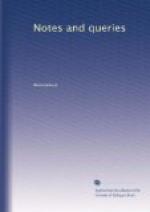These “Pepys papers,” as far as I can recollect, were very voluminous, and relating to all sorts of subjects; but I saw them in 1824, and had only then time to examine and extract for publication portions of the correspondence.
Braybrooke.
Audley End, March 25.
Vertue’s Manuscripts.—The MS. quoted under this title by Malone is printed entire, or rather all of it which refers to plays, by Mr. Peter Cunningham, in the Papers of the Shakspeare Society, vol. ii. p. 123., from an interleaved copy of Langbaine. Since the publication of that paper, the entries relating to Shakspeare’s plays have been given from the original MS. in the Bodleian Library, in Halliwell’s Life of Shakspeare, p. 272.
S.L.
Vertue’s MSS. (No. 20. p. 319.) were in Horace Walpole’s possession, bought by him, I think, of Vertue’s widow; and his Anecdotes of Painting were chiefly composed from them, as he states, with great modesty, in his dedication and his preface. I do not see in the Strawberry-Hill Catalogue any notice of “Vertue’s MSS.,” though some vols. of his collection of engravings were sold.
C.
Lines attributed to Tom Brown.—In a book entitled Liber Facetiarum, being a Collection of curious and interesting Anecdotes, published at Newcastle-upon-Tyne, by D. Akenhead & Sons, 1809, the passage attributed to Tom Brown by your correspondent “J.T.” is given to Zacharias Boyd.
The only reference given as authority for the account is the initials H.B.
“Zacharias Boyd, whose bust is to be seen over the entrance to the Royal College in Glasgow, while Professor in that university, translated the Old and New Testament into Scotch Metre; and, from a laudable zeal to disseminate religious knowledge among the lower classes of the community, is said to have left a very considerable sum to defray the expense of the said work, which, however, his executors never printed.”
After a few specimens, the account goes on
“But the highest flight of
his Muse appears in the following
beautiful Alexandrine:
“And was not Pharaoh a saucy rascal?
That would not let the children of Israel, their wives
And their little ones, their flocks and their herds, go
Out into the wilderness forty days
To eat the Pascal.
“H.B.”
Speaking of Zachariah Boyd, Granger says, (vol. ii. p. 379.):
“His translation of the Scripture in such uncouth verse as to amount to burlesque, has been often quoted, and the just fame of a benefactor to learning has been obscured by that cloud of miserable rhymes. Candour will smile at the foible, but applaud the man.
“Macure, in his account
of Glasgow, p. 223., informs us he
lived in the reign of Charles
I.”




